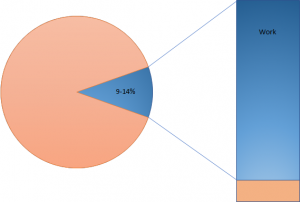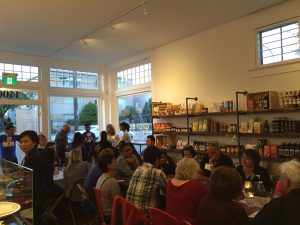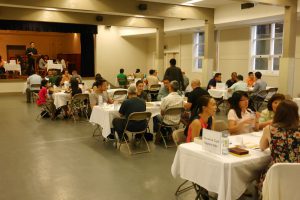There are some people here at St. Anthony’s who are being spiritually neglected, do you know who they are? Take a guess.
I’m thinking, first of all, about our youth; we have no formal youth ministry program. We also have nothing dedicated for our young adults. And, as we’ve mentioned before, 91% of Catholics, by the time they reach the age of 22, will fall away from their faith. What are we doing to stop this? Not as much as we could. We also don’t have regular care for the homebound, no couples’ ministry, and very few small groups. Many people would like more times for Confession, and some want opportunities for spiritual direction.
I heard a story about a priest in Denver who would visit a family in the parish every single night. When I heard this, I felt very badly, because this is impossible for me, as I have too many evening commitments. More people would like to visit with their priest over dinner, but it’s not possible.
Outside of the parish, there are people in our community who aren’t getting the help we could give them. When our archdiocese had the Catholics Come Home campaign, someone told me that some non-practicing Catholics never came back because no one invited them. They didn’t feel missed because maybe we don’t really miss them, which means we’re neglecting them.
So, while we do a great job in many things, in ways that other parishes don’t, we have a problem: We’re not fulfilling our mission as best we can. Our mission is not just to come to Sunday Mass and maintain the status quo; our mission is to make disciples for Christ and lead them to heaven. We’re meant to grow and help as many people as possible.
When we look at the first reading, we see that the early Church had a similar problem: They were growing so quickly that some people were being neglected. Hellenist Christians, which means Greek Christians, were complaining against the Jewish Christians “because their widows were being neglected in the daily distribution of food” (Acts 6:1). So the apostles called everyone together and gave a two part answer:
 1) They said, “It is not right that we should neglect the word of God in order to wait on tables” (Acts 6:2). Because they had been ordained by Jesus as apostles, only they could celebrate the sacraments and pass on His teaching authoritatively—no one else could. Because of that, they should not be the ones taking care of the widows. This isn’t to say taking care of the widows was unimportant; it was important, but not at the expense of neglecting passing on the most important message in the world, which was their first vocation.
1) They said, “It is not right that we should neglect the word of God in order to wait on tables” (Acts 6:2). Because they had been ordained by Jesus as apostles, only they could celebrate the sacraments and pass on His teaching authoritatively—no one else could. Because of that, they should not be the ones taking care of the widows. This isn’t to say taking care of the widows was unimportant; it was important, but not at the expense of neglecting passing on the most important message in the world, which was their first vocation.
Now listen to their words again: “It is not right that we should neglect the word of God in order to wait on tables.” “That’s pretty strong. In other words, ‘We would be doing the wrong thing to continue to care for the widows.’ I just hope there weren’t any widows at the meeting” (Andy Stanley, Next Generation Leader, 31).
Ten years ago, the whole Archdiocese completed a nine-year process called a ‘synod,’ which brought together hundreds of clergy and lay people who examined how the Church in Vancouver could more effectively fulfill her mission. It came up with 50 recommendations and the first and most important was: “Encourage pastors to delegate more of their administrative duties to the laity to allow priests a greater opportunity to be spiritual leaders and teachers.”
This proposal was strongly supported by lay people because the common complaint among them is that “our priests are too busy doing administration.” They want their priests to do what only they can do, because only a priest can celebrate Mass, hear Confessions and anoint.
Who’s heard of the 80/20 principle? When applied to groups, it says that 80% of the work is done by 20% of the people, so only a core group of people do most of the work. When a study of this principle was done on Catholic parishes in the US, it found that the 80/20 principle wasn’t accurate. It was actually 7% of parishioners doing 80% of the work (Matthew Kelly, The Four Signs of a Dynamic Catholic, 11-12).
 Here, we have 1,050 people every weekend, and I would estimate that 100-150 people do most of the work, so that’s 9-14%. The solution to overcoming the neglected people generally isn’t to ask these same people to do more work. That’s what the apostles were getting at: no one should neglect their most important task according to their vocation. Priests should do what only priests can do, same thing for deacons, parents, etc.
Here, we have 1,050 people every weekend, and I would estimate that 100-150 people do most of the work, so that’s 9-14%. The solution to overcoming the neglected people generally isn’t to ask these same people to do more work. That’s what the apostles were getting at: no one should neglect their most important task according to their vocation. Priests should do what only priests can do, same thing for deacons, parents, etc.
 2) Here’s the second part of their solution. They chose seven men “of good standing, full of the Spirit and of wisdom” (Acts 6:3) and appointed them with the mission of taking care of the Hellenist widows. The solution was calling others to serve!
2) Here’s the second part of their solution. They chose seven men “of good standing, full of the Spirit and of wisdom” (Acts 6:3) and appointed them with the mission of taking care of the Hellenist widows. The solution was calling others to serve!
For us, keeping in mind our mission to bring people closer to Jesus and grow in holiness, we have to select people who are qualified, train them, and then appoint them to different ministries within our church.
Everyone has something to offer. Some of us don’t realize this. Everyone, for example, has a mission to greet other people here—it’s a responsibility, not an option. Because we are brothers and sisters in Christ, we’re supposed to take care of each other. When we have visitors, it’s not just my job to welcome them, or the greeters’—it’s everyone’s job.
One thing I love about Alpha is that it teaches us to pray with each other. During the Alpha weekend, we have opportunities to pray for each other one-on-one. So, when people here need prayers, they not only can go to a priest, but ask others to pray for them. You can say, “I’ll pray for you. Can I pray with you now?” It may take some training, practice and experience, but this is something we have to get used to.
One thing I love about the Faith Studies is that it teaches Catholics to talk about their faith with other people. It builds confidence and openness; it teaches us how to help other people know and love Jesus. All of you, because of your baptism, have a mission to teach other people.
Protestant churches tend to think of church sizes in this way:
- House church (up to 40 members)
- Small church (40-200 members)
- Medium church (200-450 members)
- Large church (400-800 members)
- Very large church (more than 800 members)
You see, we tend to think of St. Anthony’s as a small church. In fact, in our diocese, we’re mid-size, being the 33rd highest in terms of Mass attendance out of 77 parishes. But we tend to think small: We think one priest, one deacon, and one office assistant is enough. This mentality is part of why people get neglected. Would anyone run a school for 1,000 students with one principal, one vice-principal, one secretary, and a few volunteer teachers? Would you send your kids to a school like this?
We have to think in terms of the mission Jesus gave us: to help people grow to love God with all our heart, mind, soul and strength, and to love our neighbour as ourselves. So here are a few things we can do:
- Everyone please get involved. When there’s a need for some help, please step forward. This parish is a family, and everyone in a family should pitch in; everyone should be involved in some ministry. We’ve mentioned before how it’s not part of God’s plan that we come to Mass and leave without having any interaction with our brothers and sisters.
- Please smile and greet people outside (don’t talk in church), and get to know each other’s names.
- Offer to pray for each other. Take Alpha and learn how to pray with other people. (Starting in June, our parish Alpha leaders are going to The Door Is Open on the downtown Eastside to offer breakfast on Saturday mornings, and then offer Alpha to anyone who comes. We will also offer Alpha again at the local café, Gigi Blin, starting in September. Alpha leaders will be at the Welcome Booth to answer questions and have information on how everyone in this parish can get involved in this mission.)
- Share your faith—this is our most important mission! Ask each other, “How are things going spiritually?” Could you imagine that Catholics at church, during a pancake breakfast, for example, ask each other about their relationship with Jesus!? Yes, I know, this is shocking, radical thinking. Take the Faith Studies so that you grow in knowledge and love for God, so that you understand the process of growing in faith, and so that you grow in openness and confidence.
- As a parish, we’re going to hire more people because we need it, and because other parishes our size have many full-time staff.
- When it comes to the priest, let’s delegate things that he doesn’t have to be involved in. Help me focus on the spiritual things, the responsibilities that only I can do, not because I don’t want to do the other things; but for your sake, the reality is, I can’t do them on my own.
What we’re doing is following the example of the early Church. After they made this decision, the widows had better care than before! By delegating this responsibility, the job was better done! The apostles also focused on prayer and preaching. And it says, “The word of God continued to spread; the number of the disciples increased greatly in Jerusalem, and a great many of the priests became obedient to the faith” (Acts 6:7). So they were fulfilling their mission. Lastly, by people stepping forward to serve, unexpectedly, two new leaders emerged: St. Stephen, who became the first Christian martyr, and St. Philip, who preached all over the Middle East.
We’re already doing this to a certain extent. Our parish is already growing because so many people are seeking Christ and serving. But we need more. No one will be neglected if more people serve.

